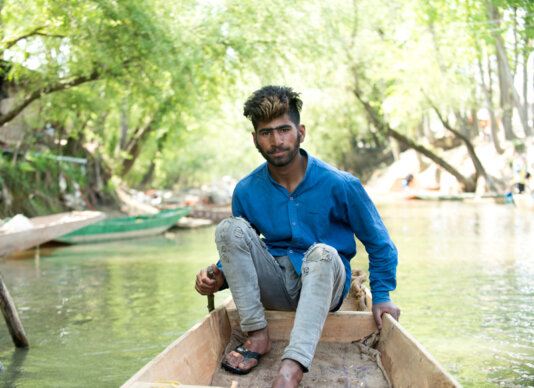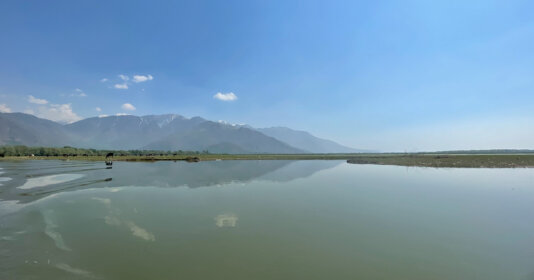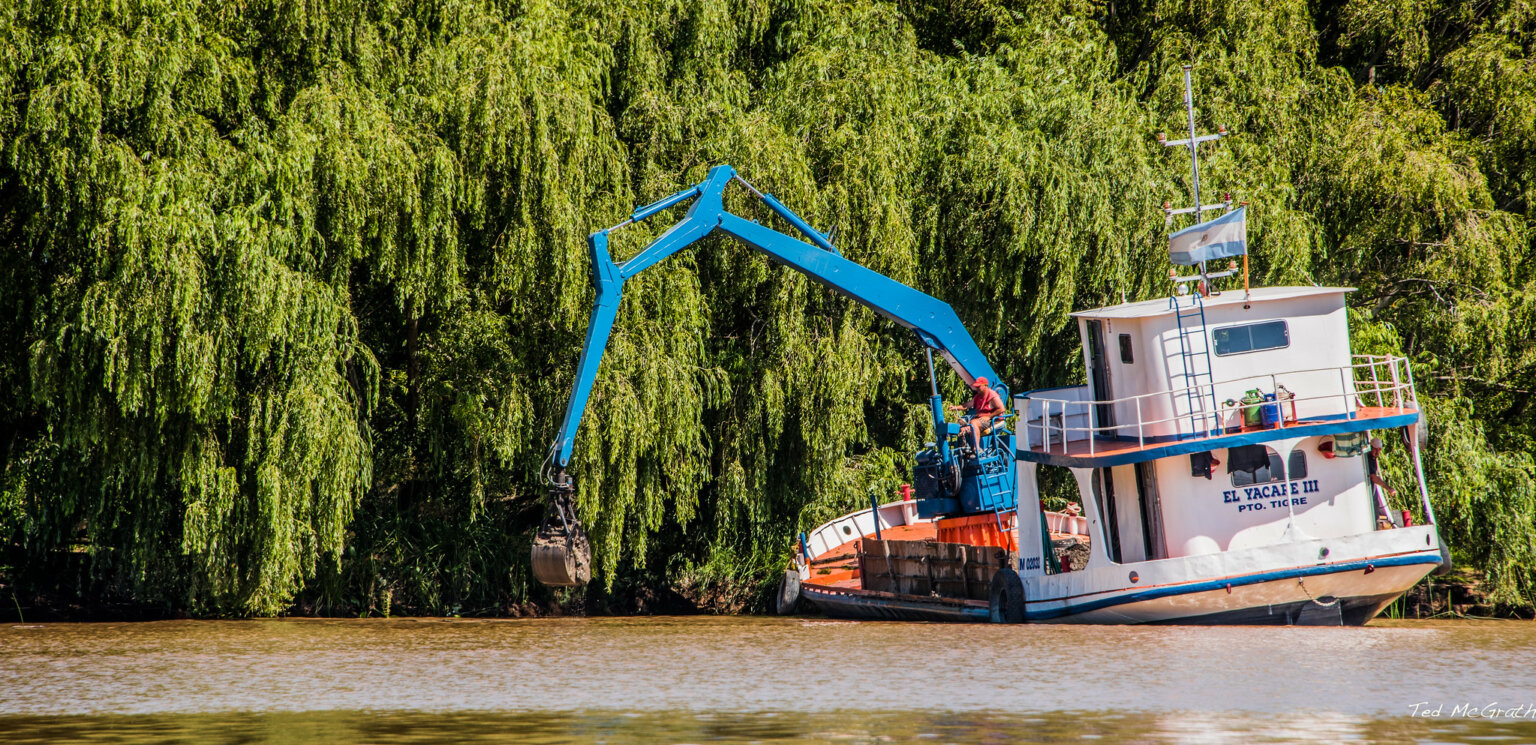- About
- Topics
- Picks
- Audio
- Story
- In-Depth
- Opinion
- News
- Donate
- Signup for our newsletterOur Editors' Best Picks.Send
Read, Debate: Engage.
| May 11, 2022 | |
|---|---|
| topic: | Conservation |
| tags: | #Kashmir, #Wular Lake, #water pollution, #fishery |
| located: | India |
| by: | Inzamam ul Ahad |
Seventeen-year-old Umer Shafi Reshi spent an entire night on his boat, hoping to catch some fish in the Wular Lake in the Bandipora district of Indian-administered Kashmir. He had his dinner and tea on the boat. He did not sleep at all.
He managed to catch three kilos of fish, which he would sell for USD$11 in the market. But when he calculated how much he had to spend on fuel, dinner and an extra worker, his total earnings from the night were just over two dollars.
Reshi, who lives in the Lankreshipora village of Bandipora District, is the sole breadwinner in his family. He dropped out of school when he was in 7th grade because his father's health deteriorated and his treatment cost a hefty amount.
Reshi was quite lucky to be able to save some money from the catch that night; another villager, Mohammad Yusuf Dar, said he managed to catch just one-and-a-half kilos of fish. "That would fetch me a little over 2 dollars, but it cost me double the amount the entire night for the fuel and labour. There are eight family members dependent on me. How will we survive?"
Dar said that Wular Lake, famous for its hydrographic significance and the important wildlife surrounding it, has turned into a 'desert', as there remain very few fish now in its waters.
That is what Wular, one of Asia'a largest freshwater lakes, has to offer now to the fishermen who earn a livelihood from it. The lake, spanning over 200-sqkm between the Baramulla and Bandipora districts north of Kashmir, used to produce up to 5,000 tons of fish of 11 different species each year, and sustains roughly 9,000 families in about two dozen villages. The lake also produces around 4 metric tons of water chestnuts annually.
Over the years, the lake has shrunk in size and been filled with waste and sewage produced from cities and major towns. An analysis by Wetland International in 2007 revealed a steep decline in the fish catch over the last fifty years. "The total catch as extrapolated from the catch records from the surveyed villages (on the peripheries of Wular lake) has declined from 10,544 tons per to 1,476 tons per annum."
A 2019-20 study by Sher-e-Kashmir University of Agriculture and Science Technology's Fisheries Department found that the Catch Per Unit Effort was 237 grams per man per hour. Catch Per Unit Effort is used to measure the abundance of a target species. Professor Feroz Ahamad Bhat, who supervised this research, said that the data showed the fish production in Wular Lake was on the decline.
Another study conducted from 2017 to 2018 suggests that the unabated pollution has resulted in the decline not only of native fish species but also of exotic production from the lake.
The survey found that large quantities of sewage discharged from Srinagar (Indian-administered Kashmir's largest city) and other major towns flow into the lake, which harms the growth and development of the fisheries in general and particularly of sensitive species, including schizothorax, the lake's indigenous fish.
The reasons for the lake's condition, Dar and many other villagers believe, are encroachment, siltation, construction of dams and unabated pollution.
They blame the successive governments for the degradation of the lake and accuse the current administration of abrogating its responsibility to preserve Wular. "The administration does not even clean the lake or free it from encroachments," said Dar. "How will the fish breed or survive in this lake?"
Mudasir Mehmood, coordinator of the Wular Conservation and Management Authority, told FairPlanet that the major issue afflicting the Wular Lake is siltation, but argued that their preservation efforts have come to fruition. He said that agency has restored an area of 4.35 square kilometers over the last decade in order to increase water expansion. Mehmood added that around 100,000 willow trees, which are the main cause of siltation, are being removed to preserve the natural habitat of fish.
The Wetland International survey also revealed that "with a three-fold increase in the population of households dependent on fisheries and a decline in the overall catch, the per capita catch has gone down by 20 times." As a result, it concluded, the income of the fishermen has taken a hit.
Several fishermen in the area toldFairPlanet that they were in huge debt. Imtiyaz Ahmad Dar (32) said that he has earned only 33 dollars in one month. "I prefer being at home now because it would cost me much more if I go fishing. How am I supposed to sustain my family?"
Another fisherman, Fayaz Ahmad Hundoo, said he was over 800 dollars in debt. "I barely earn anything and there are no fish in the lake. I do not have any other skill through which I could earn a living. How can I pay my debt and feed my family?" Hundoo asked.
Abdul Salam Reshi, a sixty-year-old fisherman, echoed Hundoo's statements, saying that he and his community are skilled in fishing only. "This is what we have done all our lives. I cannot work as a labourer at this age now."
He said that some people have taken other jobs to pay their debts and sustain their families. "Those who could afford it are driving cabs or working as salesmen. Some extract sand from the lake or the Jhelum river to make ends meet."
In January this year, two fishermen lost their lives while extracting sand from the Jhelum river. "It's a risky job. They were brought up as fishermen. They were not trained as sand extractors," Dar said.
Muneer Ahmad Wani, Assistant Director at the Department of Fisheries, told FairPlanet that the decline in fish production was a result of the shrinking water body. "Yes, there has been a decline in the catch, but that is because the lake has reduced in its size," Wani said. "The department is taking steps to boost production. We are also taking action against the illegal practice of fishing." He added that due to pollution and encroachment, there is little breeding ground for fish.
Wani further claimed that the government has cleaned, de-wed and dredged the lake for better reasons, and has tried to halt the practice of fishermen using nets in manners that flout the regulations.
Dr Faros Ahmad Bhat, Associate Professor at the Sher-e-Kashmir University of Agriculture and Science Technology's Faculty of Fisheries, told FairPlanet that due to the dense vegetational cover, the breeding ground is more conducive for the spawning of carp species rather than the indigenous schizothorax, a fish species preferred by consumers for its taste and indigeneity. Locals prefer cooking the native fish on special occasions over other species, Bhat added.
"In commercial catches the exotic carps contribute around 60 percent," he said.
Bhat added that at least three indigenous fish species are not found in Wular Lake anymore. He said, though, that there is not an easy way to restore or boost the production of indigenous fish species. "There needs to be a proper and dedicated management plan. There is a need to dredge and de-weed the lake and to keep the Wular clean so that once it's pollution-free, the local schizothorax specie might grow again."
In Lankreshipora, fishermen stated that if nothing changes and should the government not do anything to secure their survival, they might have to start selling their utensils to buy food.
Image by Inzamam ul Ahad.
By copying the embed code below, you agree to adhere to our republishing guidelines.




